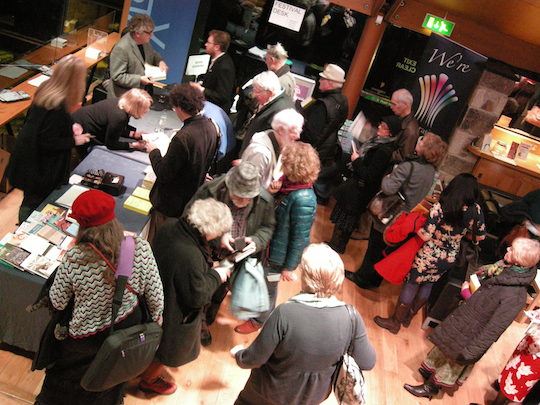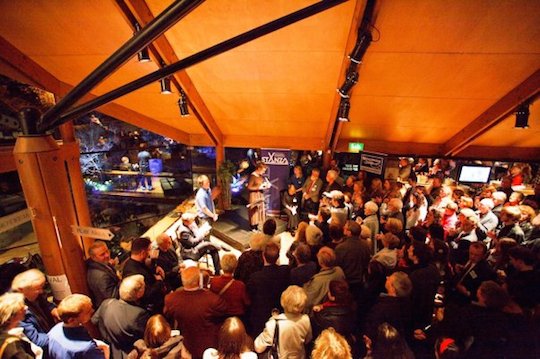Earlier this spring I attended StAnza, one of Scotland’s major international poetry festivals. After an early flight from Stockholm to Edinburgh, I boarded a bus taking me to the east coast of Scotland. The bus made its way through twisty and narrow roads, overlooking green hills on one side, while the other faced long, golden sand dunes and black rocks coated in seaweed. Two hours later, I arrived at the city of St. Andrews, or as the Scots say it, Saunt Aundraes, the home of the festival.
The next day, after finishing my first—and probably last—Haggis breakfast (it does require a certain taste!) at the seaside B&B where I was staying, I made my way down to the city centre. St. Andrews dates back to the Dark Ages and has seen its share of bloody battles. The ruins of Scotland’s largest cathedral rest on a green hill overlooking the North Sea. I watched the grey stones as the sea wind infiltrated their cracks, creating a whizzing song. Once in the main square, coffee places, sushi bars, various shops, and traditional Scottish pubs line the streets. The square buzzed with students and festival visitors, hopeful and excited in their own way. It was not hard to see why a literary festival would be held in this town; even the uneven cobblestones seemed to have a story to tell.
The StAnza Festival started in 1998 in St. Andrews and has since grown both in popularity and size. I was excited to have been invited to read at StAnza alongside poets I admired and studied as a student. I was published a year previously in the same poetry anthology as one of the festival’s headline poets, Carole Ann Duffy (In Protest: 150 Poems for Human Rights). The poem was about the Iran and Iraq War, and dealt with questions like Is a war really ever over for those who survived it?
My poem was well suited to the festival’s theme: Words Under Fire. 2014 being the centenary of the start of the First World War, a series of events were arranged to recognize the legacy of poetry from this era and to cast a light on other wars around the world. A variety of workshops and readings explored how poetry and war emerged through this era.

People ask me often if war and poetry are a really good fit, and I always tell them that war is perhaps best fitted to be vocalized through poetry. The immense scars of war need poetry to remind us that in the mist of all this inhumanity, there is indeed humanity. That a war is not just about good and evil, but it is about people, it is about someone’s son, wife, father, grandmother…And it is filled with pain, but also with longing and the hope for a better future. Poetry demands a certain explicitness of the language that helps to shape the essence of war. Through her condensed form, poetry offers a platform for the unspeakable, compelling us to feel long after we have left the reading or set aside the book.
Some of those who participated in the festival had firsthand experience of war; others wrote poetry that views the field of battle through others’ eyes. Inspired by Wilfred Owen’s poems (the leading poet of WWI who wrote in English), there was an exhibition by Stephen Raw named “Was it for this the clay grew tall.” In the lecture “The Great War at Home and Abroad,” the acclaimed poet and translator David Constantine gave a voice to other WWI poets around the world, reminding us all that we are not so different after all.
The festival’s second theme was A Common Wealth of Poetry, and here poets from India to Jamaica joined each other on the stage. The panel discussion was fascinating, with each panelist bringing a unique perspective to the concept of “home,” although it seemed as if no one was clear about what home is. The Welsh poet Menna Elfyn read her poems in Welsh—and I didn’t understand a word—but yet there was a song in her poems that needed no translation. I almost stopped listening when she re-read them again in English, as I wanted to keep the sound of the Welsh words tinkling a little bit longer in my ears.
StAnza really is what it calls herself to be, a truly international festival dedicated to poetry. After several coffees and drinks—during which all different things began to make sense regarding life, writing, poetry, and language—it hit me that the best part of a festival is never about the events, but always about the people.
***
Jasmine Heydari is Asymptote’s editor-at-large for Sweden. She was born in Iran and moved to Sweden at the age of six. She has a diverse academic background from three different countries, and holds an an MA in creative writing and a BA in drama from Kingston University in London, a diploma in language studies (Mandarin) from Ren Min University in Beijing, and she has studied pedagogy and psychology at Stockholm University. She is a freelance translator and writer.
***
Featured image by Kurt Paris.
Second image by Christine Clark.
All images via StAnza festival director Eleanor Livingstone.

